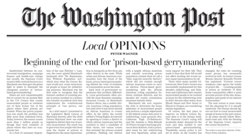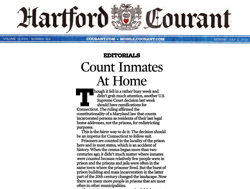Western Massachusetts newspaper reports that state lawmakers are looking for ways to end prison-based gerrymandering.
by Peter Wagner,
July 27, 2012
 Massachusetts is headed in the right direction towards ending prison-based gerrymandering, reports a new feature in the Valley Advocate.
Massachusetts is headed in the right direction towards ending prison-based gerrymandering, reports a new feature in the Valley Advocate.
“The way the Census Bureau counts people in prison creates significant problems for democracy and for our nation’s future,” in the words of the Prison Policy Initiative, a think tank based in Easthampton. This “prison-based gerrymandering,” PPI says, “leads to a dramatic distortion of representation at local and state levels, and creates an inaccurate picture of community populations for research and planning purposes.”
PPI and other groups have been pushing to change that system for years, and it appears they now have some powerful allies on their side—among them, state Sen. Stan Rosenberg (D-Amherst), the Senate’s president pro tempore and co-chair of the Legislature’s Joint Committee on Redistricting. “The whole point of redistricting and the whole point of our system is, we all have equal representation,” Rosenberg told the Advocate. By counting incarcerated people who, by law, are not able to vote in the districts where they’re locked up, he explains, “you are creating disproportionate voting power in those districts among those people who are eligible to vote.” In light of that inequity, Rosenberg said, it just makes sense for the census to change the way it counts prisoners.
Read the rest of the great article on newsstands throughout Western Massachusetts this week or on the Valley Advocate’s website: Prisoners Count: Lawmakers look at fixing Massachusetts’ “representation without population” problem.
The Norwich Bulletin urges the legislature to pass bill to count incarcerated people at home for the next redistricting cycle.
by Leah Sakala,
July 24, 2012

Lately the Connecticut press has been buzzing with coverage of prison-based gerrymandering. Following the U.S. Supreme Court’s affirmance of Maryland’s historic law ending prison-based gerrymandering, states like Connecticut are showing a renewed commitment to passing legislation to count incarcerated people at home for redistricting purposes in the next decade.
Most recently, the Norwich Bulletin printed an editorial, “Our View: Prisons Skew Census Numbers,” calling on the Connecticut Legislature to take action. The editorial explains why the question of where incarcerated people are counted is a big deal for Connecticut’s democracy:
Those skewed population figures also impact legislative boundaries that are re-apportioned every 10 years based on the U.S. Census. These individuals are ineligible to vote because they are convicted felons serving prison sentences, yet they are counted as residents in calculating and redrawing political boundaries.
Maryland adopted a law that counts prisoners as residents of communities of their last legal address, not the community where they are incarcerated — a law the U.S. Supreme Court upheld as constitutional earlier this month.
Connecticut has twice tried to adopt a similar measure, but with no success. We hope that lawmakers will try again next year.
This editorial also presented a great opportunity for our Executive Director to clarify that the legislation to count incarcerated people at their home address for redistricting purposes does not impact funding distribution in any way. It’s a common misunderstanding, but state or federal funding formulas are never based on state redistricting data.
And if you missed it, be sure to check out the recent Hardfort Courant editorial as well.
In the next legislative session Rep. La Shawn K. Ford will reintroduce legislation to count incarcerated people at home for redistricting purposes.
by Leah Sakala,
July 24, 2012

Representative La Shawn K. Ford
The days of prison-based gerrymandering may be numbered in Illinois.
This morning, Illinois State Representative La Shawn K. Ford announced that the U.S. Supreme Court’s decision to uphold Maryland’s law ending prison-based gerrymandering reaffirms his proposed legislation to count incarcerated people at home for state and local redistricting purposes in Illinois:
“My bill, and the one passed by Maryland, represent state-based solutions to a long- standing problem in the federal Census. The federal census counts people in prison as residents of the prison location, even though they can’t vote and remain residents of their homes for all other legal purposes,” said Rep. La Shawn K. Ford (D-Chicago).
The Illinois bill introduced by Rep. Ford, HB 94 made it all the way to a floor vote last year. Rep. Ford expects to re-introduce legislation in the next session of the Illinois General Assembly. New York, Delaware and California have already passed similar laws.
Rep. Ford’s bill would adjust redistricting data to count incarcerated people where they live. The bill applies to state, county, and municipal redistricting data, ensuring that prison populations are not used to skew political power in state or local government. Such changes to redistricting data have no affect on the distribution of federal funds.
“Representative Ford has been advocating for an end to prison-based gerrymandering long before the problem was on the national radar. The Supreme Court has given a green light to Rep. Ford’s bill to end prison-based gerrymandering in Illinois,” said Peter Wagner, Executive Director of the Prison Policy Initiative and the nation’s leading expert on how the Census Bureau’s practice of counting incarcerated people as residents of the prison locations harms the democratic process.
Ending prison-based gerrymandering in Illinois would be beneficial to every resident who does not live next to a large prison, and Rep. Ford’s legislation has the support of a strong local coalition.
With all the pieces in place, and with the support of the landmark Supreme Court decision, prospects look good for Illinois to join the growing list of states that have put an end to the practice of prison-based gerrymandering.
"An End to 'Prison-Based Gerrymandering'" explains what our victory in the Supreme Court means for the national movement to end this repugnant practice.
by Peter Wagner,
July 14, 2012
 Tomorrow, the Washington Post will run my op-ed Beginning of the end for ‘prison-based gerrymandering’. The piece reviews last month’s Supreme Court ruling that summarily affirmed Maryland’s “No Representation Without Population Act” that counts incarcerated people as residents of their home addresses for redistricting purposes. This decision gives the green light to states to eliminate the repugnant practice of prison-based gerrymandering.
Tomorrow, the Washington Post will run my op-ed Beginning of the end for ‘prison-based gerrymandering’. The piece reviews last month’s Supreme Court ruling that summarily affirmed Maryland’s “No Representation Without Population Act” that counts incarcerated people as residents of their home addresses for redistricting purposes. This decision gives the green light to states to eliminate the repugnant practice of prison-based gerrymandering.
The op-ed is already online.
Court rules that states can adjust redistricting data to better reflect their populations; now will Wisconsin end prison-based gerrymandering?
by Leah Sakala,
July 9, 2012
After the recent U.S. Supreme Court ruling upholding Maryland’s 2010 law ending prison-based gerrymandering, Maryland residents could breathe a sigh of relief. But a great Wisconsin Pubic Radio piece points out that the ruling from the highest court in the nation unquestionably affirming states’ ability to adjust Census redistricting data establishes an important precedent for other states as well.
As Wisconsin Public Radio’s Shawn Johnson reports,
It’s a change some lawmakers, including Milwaukee Democratic Rep. Fred Kessler, wanted to make in Wisconsin a few years ago. Kessler says the court’s ruling shows there’s nothing in the Constitution that prevents it, “If the plan were adopted, I think it would hold up at this point. I think now we’ve been tested.”
Currently, prison-based gerrymandering skews Wisconsin’s districts on both the state and local levels, but the the effects are especially dramatic in city and county governments. 80% of the people counted in one Juneau County district, for example, is behind bars. That means that two actual residents of the district with the prison now given as much say in county affairs as 10 residents in any other district. This is hardly in compliance with the constitutional principle of “one person, one vote.”
Hopefully the green light from the Supreme Court will encourage Wisconsin to follow in the footsteps of Maryland, New York, Delaware, and California and bring an end to prison-based gerrymandering once and for all.
HB 1934 prevents Census Bureau's prison count from unfairly forcing small municipalities to implement a curbside recycling system.
by Leah Sakala,
July 6, 2012
Remember how the Census Bureau’s prison count was causing problems for the recycling system in Kelly, Pennsylvania? Last week, the Pennsylvania Legislature came to the rescue.
Because the Census Bureau included the people incarcerated in the large federal prison in the town’s official population, Kelly was suddenly responsible for implementing a curbside recycling system required for all municipalities with more than 5,000 people, even though the number of actual residents (and therefore recyclables) was far below the mandate threshold. What’s more, the federal prison’s recycling system is entirely independent from that of the town.
Fortunately, last week the Governor signed House Bill 1934, which amends the state recycling mandate to exclude the populations of federal and state facilities that have their own recycling systems for the purposes of determining which municipalities are big enough to be covered by the mandate. I’ve been tracking this legislation since it was introduced last year, and was pleased when it passed both houses unanimously before being signed into law.
As bill sponsor Rep. Fred Keller pointed out in March, his legislation is a logical solution to a bigger problem:
According to the census, nearly one-third of Kelly Township’s population currently resides at the Federal Correctional Institute […] Consequently, Kelly Township, while being required to implement a population-based state recycling program, is strictly prohibited from collecting recycling from the prison. House Bill 1934 is a commonsense attempt to minimize the unnecessary duplication of waste management efforts and costs.
Although the new law will let Pennsylvania towns with big prisons off the hook as far as recycling is concerned, the Census Bureau’s practice of counting incarcerated people as if they were members of the communities that contain prisons gives rise to a whole host of problems. Now that planning for the 2020 census is already underway, it’s time for the Census Bureau to plan ahead to count incarcerated people at home next time.
Editorial lauds the U.S. Supreme Court’s decision to uphold the MD law ending prison-based gerrymandering, calling on CT to follow MD's lead.
by Leah Sakala,
July 6, 2012

The Hartford Courant is cheering the U.S. Supreme Court’s decision to uphold the Maryland law ending prison-based gerrymandering. In an editorial on Monday, the paper called on the Connecticut Legislature to follow Maryland’s lead and count incarcerated people at home for redistricting purposes.
As the editorial proclaimed:
Though it fell in a rather busy week and didn’t grab much attention, another Supreme Court decision last week should have ramifications for Connecticut. The ruling affirmed the constitutionality of a Maryland law that counts incarcerated persons as residents of their last legal home addresses, not the prisons, for redistricting purposes.
This is the fairer way to do it. The decision should be an impetus for Connecticut to follow suit.
Connecticut has a head start on ending prison-based gerrymandering, with an active campaign already in place. Although the effort in the previous legislative session was unsuccessful, the Courant editorial insists that it must be a priority for the next legislative session.
I note that Connecticut has been on a long march towards fairer redistricting for the last half a century. Fifty years ago, districts were apportioned in a way that gave the residents of some towns hundreds of times the influence of residents in the urban centers. Connecticut rightly fixed that injustice, and ending prison-based gerrymandering is the next logical step.
Also, since Maryland-style legislation counts incarcerated people at home for redistricting purposes only, the Connecticut legislature could end prison-based gerrymandering without worrying about inadvertently impacting funding formulas. Political power, not money, is at stake here.
The editorial concludes with a strong point about fairness:
The vast majority of inmates leave prison, and most go home. That’s where they should be counted.
Maria Morales writes on the civil rights victory that was won when the U.S. Supreme Court upheld Maryland's law ending prison-based gerrymandering.
by Leah Sakala,
July 5, 2012
The AFRO recently published a great piece by Maria Morales about the U.S. Supreme Court’s decision last week to uphold Maryland’s law ending prison-based gerrymandering.
The article reports that the ruling in Fletcher v. Lamone was a major victory for the civil rights community. As Ajmel Quereshi of the Howard University Law School’s Civil Rights Clinic points out, the practice of prison-based gerrymandering was,
one of the discriminatory ways laws impact the minority community not only at the front end with the disproportionate number of incarcerated African Americans, but it affects inner-city minority communities on the back end with redistricting.
The article also explains that relying on unadjusted Census Bureau redistricting data can stymie efforts to create effective majority-minority districts. Somerset County is one of the clearest examples, where counting the disproportionately African American prison population within the country split the real African American population between two different districts. With the African American voters too dispersed between districts to elect the candidate of their choice, not once in the county’s history had an African American been elected to office. Now that incarcerated people are counted at their home addresses for redistricting purposes, Marylanders can draw districts that more accurately reflect the communities they contain.
The article points out that the Supreme Court’s decision bodes well for efforts to end prison-based gerrymandering in other states. Rhode Island, Connecticut, Illinois, Oregon, and New Jersey may be the next states to pass similar legislation. With the endorsement of the highest court in the nation, Maryland is leading the way!
![]() Massachusetts is headed in the right direction towards ending prison-based gerrymandering, reports a new feature in the Valley Advocate.
Massachusetts is headed in the right direction towards ending prison-based gerrymandering, reports a new feature in the Valley Advocate.
 Tomorrow, the Washington Post will run my op-ed
Tomorrow, the Washington Post will run my op-ed 



